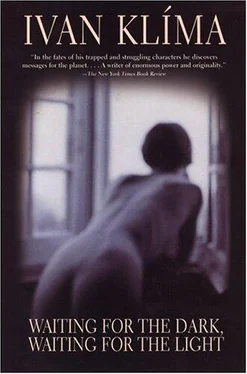Either their places would be taken by others, or their expressions would gradually adapt to fit their positions. There was still some time left before going to see Peter, but he was beginning to feel more and more uneasy.
Again he rewound the tape. He took a sip of wine. Of course, what had happened must have been a great source of satisfaction to Peter. He had laid linoleum floors, been a caretaker in a castle, endured interrogations, while he, Pavel, had spent his time making conformist documentaries, travelling the world and filming eulogies to the man who had run the country into the ground. In return, he was given bonuses and rewards, and from time to time he bought a bottle of wine and went down to see his friends in exile in their castle, and then only because he wanted to see Alice. And now his friend had summoned him and could grant him pardon, trust and work. Or not. There was something humiliating in this sudden transformation. Sokol was probably right: it would be better not to wait.
He stopped the tape, put his feet up on the control panel and lit a cigarette. In fact he had never received many bonuses because he'd never felt that he had to kowtow to the bosses the way those who weren't any good did. Instead, he would argue with them, refuse to cut what they wanted to cut. One Friday, at a weekly meeting of the chief producers, he said out loud what everyone was thinking: they were producing a mixture of blandness and tedium. And lies, he had wanted to add, but when he saw the expression on the director's face he swallowed the word. As a punishment, they assigned him to film meetings held by meaningless organizations, or official visits from their official, though hostile, allies. There were disgusting meetings, idiotic approval sessions when he had to sit and silently listen to drivel that often, in an instant, swept away days of work. The life he led was neither wonderful nor easy. Sometimes it had seemed unbearable. Like most people in this country, he'd done his job. He was one of the ones who got steamrollered daily, not one of the ones who drove the steamroller. He was overwhelmed with regret when he thought of what he might have done if they'd left him just a little freedom. He watched the delight on the faces of those
who were cutting the wires and those who were merely looking on, and he realized that he had tears in his eyes.
A melancholy alcoholic who didn't know whether he was crying for joy or grief or anger, or simply because he had drunk himself into a state in which his eyes produced tears by themselves.
Peter looked tired. He was sitting in Halama's huge office, where nothing had changed but the picture of the president and the books on the shelves. Halama had either taken his books away or, more likely, thrown them out. He never read them anyway. One of the two television sets in the room was on, but the sound was down.
Peter got up and walked over to meet him. In the few months since they had last seen each other he had aged, and his face was sallow and wan.
'Have I kept you waiting long?'
'You've kept yourself waiting too.' Pavel's stomach was in a knot.
'I didn't want to talk to you for any particular reason, but it occurred to me that we're working under the same roof and haven't seen each other yet.'
'People who work here sometimes don't see each other for months at a time. '
'I have no intention of sounding you out about anyone.'
'I couldn't tell you much anyway. In my line of work, you make sure the lighting's right and you look through the viewfinder, not at the people around you.'
'That's a little hard to believe,' said Peter, 'but that's not the point. I know people are nervous.'
'Some are, some aren't.'
'They shouldn't be.'
'You don't think so?'
'It seems to me they haven't understood that this is different from the changes they've experienced in the past. No one is going to start any purges.'
'A couple of people have been sacked already.'
'That's different. They weren't real professionals, or else they broke the journalistic code of ethics. I mean, you can't expect people to accept an announcer beating the drum for democracy when the same person was beating the drum
for the old regime a month ago. And you can't expect new programmes to be produced by old censors.' He was beginning to sound preachy.
'Most people here weren't beating the drum for anything. And it was us who argued with the censors, not you.'
Almost all of us argued in one way or another. And how about you? Are you happy with your work?'
'No, I'm not. I can't concentrate the way I'd like to.'
'Why not?'
He shrugged. 'The atmosphere around here isn't very good.'
'It was good before?'
'No, but that was different. I'm sorry. You ask me, I answer. You said yourself there were people who were unethical. Who's doing the judging here? Who decides who's guilty? And what about me? What are they going to think about me?'
'I've already told you enough times what I think about you.'
'It was hardly flattering.'
'You know very well that I've never thought of myself as your judge. I know you too well for that.'
'You don't have to apologize. If you want me out of here, just say so.'
'I don't want you out of here, but if you don't feel comfortable here, I can't force you to stay.'
'I'm glad to hear you won't force me to stay.' He should have stood up now and brought this embarrassing conversation to a close.
But Peter began to talk about himself. He said he thought it was his responsibility to take the position when it was offered but now he felt like an interloper. Some hated him, some tried to suck up to him and others tried to curry favour with him by informing on their colleagues. Yet he had neither the inclination nor the desire to play the judge. We all lived in this country. Given the conditions that existed here, every one of us came out of it scarred in some way. And who can establish a borderline between guilt and innocence, when that borderline runs somewhere right down the middle of each and every person? People
overthrew the old regime in the hope that they would finally see justice done. There would have to be an attempt at some kind of judgement. 'Someone can probably be found who can establish that borderline,' Peter said, 'but it won't be me. The job will probably be done by someone who will use it to cover up his own guilt.'
What was justice?
Justice was revenge wrapping itself in a cloak of high principle.
On television, the minister was now cutting the border wires. People behind him were cheering noiselessly. Peter looked at the screen for a moment: 'We tried to run away together once, remember?'
'That was a long time ago,' Pavel said.
'Was that really us? People meet, drift apart, and maybe they meet again, but by then they're someone else.'
Pavel nodded. 'Even so, they can still ride in the same car. That is if you're leaving too.'
When they got into his car, he said to Peter, 'I don't even know where you live now.'
'For the time being I'm living at my sister's.'
'What about Alice and the children?'
'She stayed in the country. I thought you knew.' He was silent for a long time as though wondering whether to come out with it. 'I got involved with someone else, a girl who writes poetry and sings. Alice was badly hurt. We separated.'
'I didn't know.'
It was a long time since he'd made that movie about children who had lost their fathers.
'I'm sorry,' he said. For the first time in days, he felt the unexpected touch of hope.
FILM
I
The reception takes place in the small house which also serves as his private dwelling. Tables spread with white cloths are positioned throughout five rooms. There are tables outside as well, in the parts of the garden adjacent to the house, but it still seems crowded in here. He has invited too many spongers. All those cheap suits, black faces and slant-eyed devils milling about. Wherever he looks he sees freeloaders, tinpot attachés in toy uniforms, overdressed cannibals, decorated warriors, retired admirals and failed generals, ambassadors from postage-stamp, godforsaken kingdoms and hordes of would-be artists: actors, musicians and hacks. They brought him a guest list, but he was exhausted before he finished reading the first page, so he signed it, just as he'd signed hundreds of other documents. He knows there are people here who were not on the list, people disguised in tuxedos and waiters' frock-coats, dressed up as gardeners, cooks, lighting experts and television cameramen spread out on all sides of him, creating an impenetrable circle around him.
Читать дальше











